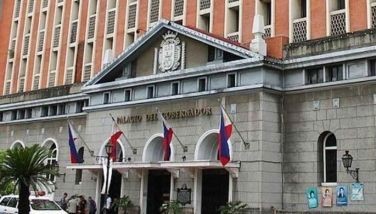Public warned on money schemes
MANILA, Philippines - Bank depositors should suspect something fishy when they are presented with interest rates way above what the market dictates, Monetary Board member Ignacio Bunye said yesterday.
Bunye warned that while legitimate banks have higher loan rates compared to their deposit rates in order to service their debts and gain profit, such concept is absent in Ponzi schemes, which only exist to rip off money from potential clients.
He said promoters of pyramiding schemes premise their marketing schemes on Philippine Deposit Insurance Corp. (PDIC) coverage.
“Scammers usually encourage their depositors to split their accounts to ensure they get their money back,” he said.
“The ownership structure of shady banks or institutions is often unclear, and Ponzi scammers are not keen on being active in the banking circle. Contrary to banking laws, the acquisition of ailing banks by the scammers is not reported to the Bangko Sentral ng Pilipinas (BSP),” the former press secretary said.
As a way to increase public awareness against these crimes, the BSP recently came up with a guide on how to detect possible bank frauds.
Quoting BSP Assistant Governor and General Counsel Juan de Zuñiga, Bunye said depositors and investors should guard against these schemes by being aware of their common characteristics.
“Bank frauds are typically committed by experts, and given the sophistication in which these crimes are carried out, they are usually carefully planned and premeditated,” he said.
“The people behind these crimes also make sure that they cover and erase their tracks. The principals —or top officials of dubious financial institutions —avoid signing documents that could incriminate them in the future,” he said.
He added that unscrupulous individuals who prey on unsuspecting depositors and investors cautiously guard against possible exposure by compulsively building up their connections and networks, and getting legal assistance early in their operations.
According to him, such schemers also put up “war chests” to support themselves upon discovery of their illegal activities. The money, he said, will be used to pay media support, litigation expenses, corruption and harassment of regulators.
He said De Zuñiga pointed out that the temporary restraining order is the schemer’s favorite legal remedy to prevent the government from going after them.
Common examples of bank fraud are unauthorized transactions by top officials of the financial institution, fictitious loans and deposits, and the conversion of deposits into shares of stock because the bank is in dire need of capital.
Of these examples, the “Ponzi” scheme —named after infamous fraud Charles Ponzi —has gained much public interest in recent months because of the arrest of Bernard Madoff, who ripped a whopping US$50 billion from his victims, and the Legacy scandal in the Philippines.
Bunye said bank fraud is a crime committed against many entities. It is a crime against the bank itself, which may consequently incur financial and reputational damage.
It is also a grave offense against the BSP, which acts as the bank of all Philippine banks, for its credit exposure, and against PDIC, which is obliged to pay insured deposits using public funds.
“Lastly, bank fraud is a crime against some innocent bank employees, who may lose their jobs; innocent stockholders, who may lose their investments; and depositors, who could lose all their deposits,” he said.
The PDIC now has a possible exposure of P14 billion as a direct result of the Legacy scam, he said.
He pointed out that as of last week, the PDIC has validated 42,886 accounts holding P381 million in deposits and has so far serviced 11,130 accounts and paid a total of P198 million in insurance claims.
“Whatever amount PDIC finally pays is a very significant additional burden to Filipino taxpayers, whose money will ultimately be made to pay for the lost deposits,” Bunye said.
He said it is “a sad reality how the rapid development of technology has enabled the proponents of white collar crimes —which are financial, economic or corporate crimes executed through sophisticated means —to target banks and their depositors with more ease.”
He emphasized that although BSP clarified that the shutdown of the banks connected with Legacy group does not affect the overall stability of the Philippine banking system and is an isolated incident, “it would (only) be prudent for Filipino depositors to think twice before investing in deceptively golden opportunities.”
“The bitter lessons learned from the experience of those who placed their earnings, savings and trust in the Legacy Group continue to haunt every Filipino who believes in the integrity and value of the banking system,” Bunye said.
- Latest
- Trending































